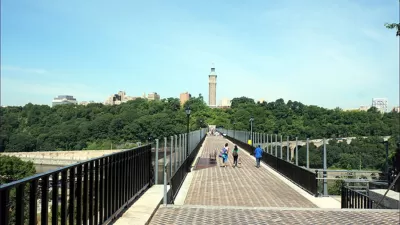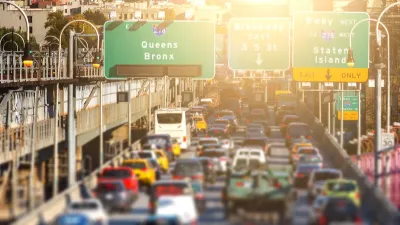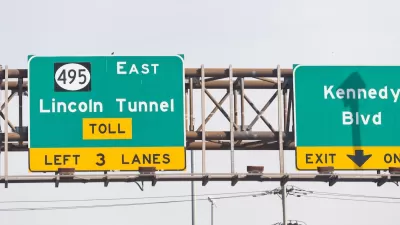Like so many other transportation policies, congestion pricing risks being sold for the wrong reasons.

Charles Komanoff, founder-director of the Carbon Tax Center, writes for Streetsblog NYC on the hot-button of topic of congestion pricing, elucidating the effects of congestion pricing relative to carbon emissions, congestion, and quality of life.
Here's how Komanoff summarizes the effect a particularly ambitious congestion pricing scheme could have on New York's emissions:
The most sweeping congestion pricing plan proposed for New York City, Move NY, will cut tailpipe emissions of carbon dioxide, the main greenhouse gas, by an estimated 950,000 metric tons a year. A little over half of that reduction, 55 percent, results from fewer auto trips from the toll disincentive along with transit improvements funded by toll revenues. The remaining 45 percent comes from smoothed traffic flow, as the lessening in stop-and-go traffic translates into better fuel economy and, thus, lower per-mile emissions.
But, according to Komanoff, "Move NY will shave just 2 percent from the total and 6 percent from the transportation part — reductions somewhere between 'modest' and 'helpful,' and well short of game-changing."
This isn't an argument against congestion pricing—instead Komanoff's argument shifts the focus to the many substantial benefits of congestion pricing that won't necessarily be measured by reduced automobile trips. While it won't stop everyone from driving, congestion pricing will make it easier for everyone to get around, writes Komanoff in a rephrasing of the "moving people, not cars" formula (recently put to the test in Virginia, to headline-friendly effect).
The true climate pay-off, according to Komanoff, is in a city that functions better and "in the thousands of households, jobs, and activities that will locate or remain in the city, rather than fleeing our crushing gridlock and dysfunctional subways for the new exurban ring or the Sunbelt or even the inner suburbs, which aren’t 'inherently green' like NYC and have carbon footprints many times larger than New Yorkers."
FULL STORY: Congestion Pricing Will Help Stop Climate Change — But Differently Than You Think

Manufactured Crisis: Losing the Nation’s Largest Source of Unsubsidized Affordable Housing
Manufactured housing communities have long been an affordable housing option for millions of people living in the U.S., but that affordability is disappearing rapidly. How did we get here?

Americans May Be Stuck — But Why?
Americans are moving a lot less than they once did, and that is a problem. While Yoni Applebaum, in his highly-publicized article Stuck, gets the reasons badly wrong, it's still important to ask: why are we moving so much less than before?

Using Old Oil and Gas Wells for Green Energy Storage
Penn State researchers have found that repurposing abandoned oil and gas wells for geothermal-assisted compressed-air energy storage can boost efficiency, reduce environmental risks, and support clean energy and job transitions.

Minneapolis Bans Rent-Setting Software
Four cities have enacted restrictions on algorithmic software that can inflate rent costs.

Oakland to Add 244 New EV Chargers
Oakland plans to launch its new charging network at eight locations by the end of 2025.

Jane Goodall Inspires with Message of Hope, Resilience, and Environmental Action
Speaking in Pasadena, Jane Goodall offered a hopeful and inspirational message, urging global compassion, environmental responsibility, and the power of individual action to shape a better future.
Urban Design for Planners 1: Software Tools
This six-course series explores essential urban design concepts using open source software and equips planners with the tools they need to participate fully in the urban design process.
Planning for Universal Design
Learn the tools for implementing Universal Design in planning regulations.
Heyer Gruel & Associates PA
City of Moreno Valley
Institute for Housing and Urban Development Studies (IHS)
City of Grandview
Harvard GSD Executive Education
Salt Lake City
NYU Wagner Graduate School of Public Service
City of Cambridge, Maryland





























